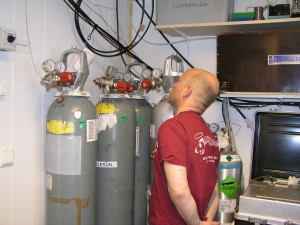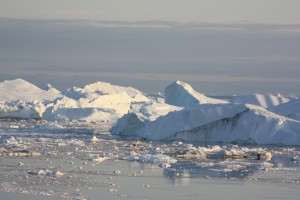Search Results for Tag: science
Polar bears evolved earlier than previously thought

Polar bear genome shows they evolved much earlier than previously thought. Picture by Alan Wilson, www.naturepicturesonline.com
A team of scientists led by researchers from the German Biodiversity and Climate Research Centre (BiK-F) has found out that polar bears evolved as early as some 600,000 years ago. The study, published in the current issue of the journal “Science”, ( Nuclear Genomic Sequences Reveal that Polar Bears Are an Old and Distinct Bear Lineage, Hailer, F. et.al) says the white giants are thus five times older than previously realised.
Why do we need to know this apart from pure scientific curiosity? Because knowing when polar bears evolved as a genetically distinct species, different from brown bears, could help us understand what is going to happen to the polar bears if the planet keeps heating up. You can read more about how the scientists came to their conclusions and what implications they could have here.
NASA scientist for carbon tax to tackle “moral issue”of climate change
Spending a few days in Scotland over Easter, I was interested to read that the NASA climate scientist James Hansen is to be awarded the prestigious Edinburgh Medal for his contribution to science. The Guardian quotes Hansen, 70-year-old director of NASA’s Goddard Institute for Space Studies and one of the longest-standing experts on climate change, as saying “averting the worst consequences of human-induced climate change is a great moral issue on a par with slavery”.
![]() read more
read more
Climate sceptics in the limelight – and under fire
I have been following with interest the coverage in the media here – and discussions amongst friends and neighbours – of a highly controversial book published in German this month: “The Cold Sun: Why the Climate Catastrophe is not taking place”. The authors, Fritz Vahrenholt and Sebastian Lüning talk down climate change and say there is no need for all the fuss. The authors suggest global temperatures are only influenced to a very small extent by CO2 emissions. They blame “more than half” on solar activity. Now this argument is not new and has been refuted by many respectable scientists – but the hype surrounding the book might lead a lot of people to think it is.
![]() read more
read more
Are emotions taking over from science in the climate debate?

I’d like to share an interesting conversation I had at the Arctic Station in Ny Alesund with Max Koenig, head of the
Sverdrup Station run by the Norwegian Polar Institute. We were speaking in German, as Max is a native German speaker, so I have translated what he said.

Max finds the idea of believing or not believing in climate change a strange and interesting development. He says it has turned into a question of faith for a lot of people. But the climate change issue is not about faith, he says, but about facts on the table. He is surprised that there seems to be a lot of “false information” floating around. “If you consider that 95% of climate researchers are generally in agreement about the nature of the problem, then I really wonder where the scepticism comes from”, says the polar specialist. “On average, our planet is warming. And we understand the physics, he says. “
When it comes to the role of the media, Norway’s Arctic station chief says he is often surprised to find different views expressed in one publication, depending on which researcher is being interviewed. He sees one of the main problems in the tendency to always have a climate scientist and a sceptic placed one against the other.
“This can give the public the impression that half of the researchers think climate change is happening and the rest don’t”, he says. “Actually, almost all researchers say climate change is taking place and yes, something has to be done now.”
The debate has also become too emotional, Max says. He thinks a real discussion is becoming increasingly difficult.
Thanks for sharing those ideas with me Max, and with the Ice Blog readers. Thanks also once again for your hospitality and the coffee, looking out onto the melting snow around the bust of Roald Amundsen.

(Ny Alesund, early June 2010)
As we get ready for a big conference here in Bonn, starting on Monday, Global Media Forum
“The Heat is On: Climate Change and the Media”, these are exactly the sort of thing we’ll be talking about. I feel a huge sense of responsibility as a journalist. Of course we want to present the “whole picture”. But we don’t want to distort the facts by getting the balance wrong.
Scientists and the Media
The University Centre in Svalbard (UNIS) in Longyearbyen is the world’s northernmost higher education institution. Unsurprisingly, Arctic biology, geology, geophysics and technology are the specialities here.

(Glaciology Prof. Doug Benn with colleagues heading for field trip to Longyearbyen glaciers – and me at the start of the trip with them.)

I was glad to have the chance to meet up with some of the experts. As well as Gunnar Sand, mentioned in a previous post as Director of the Longyearbyen CO2 Lab, I had the chance to talk to Professor Hanne Christiansen
an expert on permafrost and head of Arctic Geology at UNIS,

(on the staircase outside her office at UNIS)
and Professor Doug Benn pictured in the last entry heading up to the glaciers with two junior colleages.
As well as Arctic permafrost and glaciers (more on both later)I was interested to hear their views on climate change in general and the role of the media in particular. I was not surprised to encounter some wariness from scientists working out on the field towards journalists in view of the huge dimensions the controversy over climate has taken on in the media. Let me just share a statement from Doug Benn, who runs a field project in the Himalayas as well as his work in the Arctic, on the debate – and fuss – over the wrong figure in the IPCC report and the ensuing lack of confidence in the IPCC and even climate science in general. Doug stresses the procedure by which the error got into the report shows up serious deficits, but he also sees a lot of responsibility for what followed with the media.

“The whole impact of that whole debate was amplified both in terms of the disaster scenarios and the credibility of the IPCC by the way that media covered that particular issue. And in fact what happens is that science carries on on a much more level keel. Science is not undergoing the same mood swings that the media went through on that. The majority of scientists are plugging away, gathering good data on environmental changes that are going on, quietly publishing their results in journals, and slowly a view emerges. And so I do think it would be good if the media could correct its tendencies to go for the sensation, and of course there’s a long tradition in the media that anything that’s new and exciting is going to get prominence. But actually that does not serve science well. Mostly science proceeds by slow, careful steps and gradually pictures emerge and it takes us a long time to make up our minds about what’s happening in particular systems. Now over the whole issue of climate change and the global impact of climate change both governments and the media and indeed environmental organisations have been rather impatient, and they want definitive statements about what’s happening, we want action, we want decisions made now. And the way science works is not really compatible with that. I think the headlong rush into declaring global warming as a global disaster has been rash. This is not to say we don’t face environmental challenges, but simply that the rush has been unfortunate and actually we still need to do good science, to think critically about things. And as soon as you replace critical investigation with belief and dogma, you’re no longer doing science. Science needs the media, but it does have rather an uneasy relation with it because of these things I’ve been talking about. “
Thanks for taking the time to share those thoughts, Doug.






















Feedback